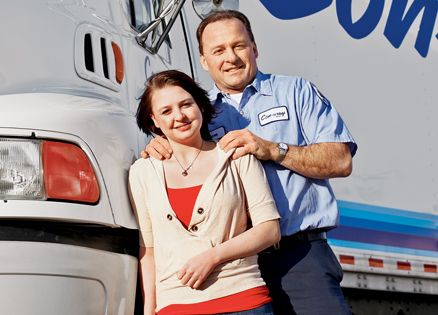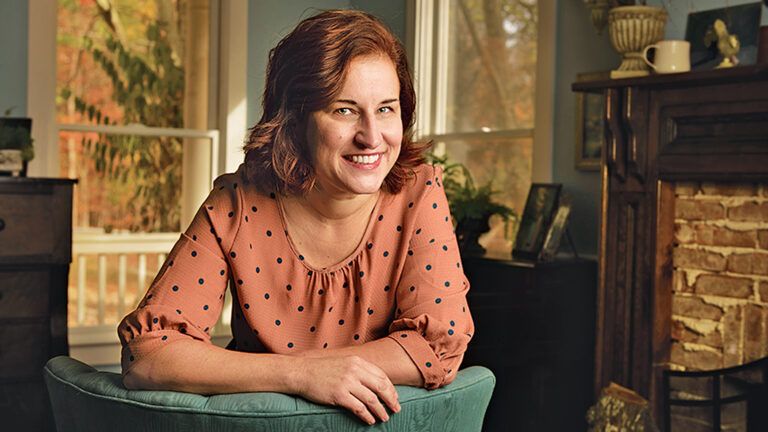My wife, Lynette, was flipping through the pile of mail on the kitchen counter. “Why didn’t you tell me?” she asked, waving an envelope while she scanned its contents.
The letter.
I’ve been a professional truck driver for 28 years and I’ve got more than a million-and-a-half miles under my belt without an accident–something my company, Con-way Freight, took notice of.
A couple months earlier they’d nominated me to become an America’s Road Team Captain, the highest honor for a truck driver. There are more than three million drivers in the country, and just 30 finalists compete in Washington, D.C., for a dozen Captain positions.
The winners travel across the country, talking to the public about transportation and road safety. It was a title I’d dreamed of for years–and that letter was my invitation to the finals.
When I read, “Congratulations! You’ve been chosen…” I can’t tell you how thrilled I was. Then I froze. A big part of the competition was public speaking. I’d never given a speech in my life! And I wasn’t sure I wanted to.
I’m the quiet type–which suits a guy who spends plenty of night-shift hours alone behind the wheel. I’m comfortable there. The only public speaking I’d ever tackled was on a CB radio.
Those long miles at night can get lonely–especially in a dark and frozen western New York winter–and it’s nice to hear another voice on the road. But chatting on my CB didn’t mean I was ready to get up in front of the industry’s leaders–the best of the best–and give a presentation, even if
it was my only chance at becoming a Captain.
Just imagining myself standing behind a podium, all eyes on me, sent my pulse into overdrive. So I’d put the letter aside. But I guess something in me couldn’t quite throw it away.
That’s why Lynette found it buried in a stack of mail. She finished reading the letter and turned to me. “This is so exciting, David!”
“I know, honey, but…”
“But what? This is your dream!”
“It’s just…I can’t do it. I’m too afraid to speak in front of all those people.”
Lynette wasn’t listening. She’d rounded up our kids. “Daddy has a chance to become an America’s Road Team Captain,” she announced. “Now he has to go to Washington and present a speech.”
I almost passed out hearing her say those words.
“That’s awesome, Dad!” said my oldest, Amanda. My son, Alex, gave me a bear hug. My youngest, my 10-year-old daughter, Amara, kissed my cheek. “I know you can do it, Daddy!” she said. Amara has a flair for the dramatic.
I wanted to tell them the truth…that I couldn’t do it. That there were a million other things I’d rather do. But those proud smiles wouldn’t let me. I’ve got to try, I thought.
But I needed help. Big time. I went to my employer. “I want to be a Captain,” I said, “but I’m not sure I’m cut out for it. I’m terrified of public speaking.”
I was signed up for our company’s media training program. I wrote a speech, and they videotaped me delivering it so I could play it back and learn how to improve.
The one thing I learned? I shouldn’t give any more speeches! My tape was painful to watch: trembling hands, sweaty brow, nervous stammer. I was a wreck. I walked out of the training, video in hand, and headed home feeling completely defeated.
What am I supposed to do now? I thought. If someone else had been struggling, I wouldn’t have hesitated to pray for them. But I was already keeping God busy watching over me on the road–I didn’t rack up all those miles without an accident on my own, that’s for sure. It just didn’t feel right asking him to help with a little speech. That was my problem.
“This speech thing isn’t for me,” I confessed to Lynette and the kids. “I’m terrible at it. I’m a driver, not an entertainer.”
I sat down on the couch with my daughters. Amanda looked me in the eye and said, “Dad, you can do this. You may have to find a way that’s more comfortable for you, but you can do it.” Amara squeezed my hand. “Dad, I’ll help you,” she said. “We’ll work on your speech together. I know a lot about this stuff, remember? Leave it to me.” She looked at me expectantly, insistently.
“Okay, it’s a deal,” I sighed.
Amara is outgoing, theatrical, animated. She shines in school plays. When I saw her in Who’s On First? I got choked up, I was so proud. Up there onstage, she was confident, cool, a natural actor–everything I wasn’t. She loved the audience and the audience loved her. Forget the selection panel; I would have to win Amara’s approval first.
The next afternoon I was napping before my shift. “Dad, wake up.” Amara was standing over me. “I need to hear your speech.”
My nerves started in all over again. I sat up, cleared my throat and began.When I was done, she smiled…kind of. “Not bad, Dad, not bad. But…”
Uh-oh. “But what, Amara?”
“Dad, you’re speeding. You need to slow down. You talk like you can’t wait to get it over with. It’ll help if you remember to breathe.”
The next day Amara stopped me in the hallway. “Dad, your speech. Let me hear it again.”
This time I remembered to slow down and pause between ideas. When I finished, she was beaming.
“Dad, you’re getting better, you really are.” Then she said that word again, “But…”
“But what, Amara?” I asked. This was already much harder than the training class at work.
“It’s just, well, I’ve heard that story from your speech so many times, and you’re always so excited when you tell it. Now you don’t sound happy,” she said. “You need to get excited again! Just be yourself. And picture the audience as full of your friends, like you’re talking on the CB.”
That’s how it went for weeks–me giving my speech and Amara coaching me. The trip to Washington, D.C., drew closer. I practiced my speech all night long on the highway, trying to work on passion and enthusiasm like Amara told me (I bet the drivers passing by thought I was nuts). I still wasn’t sure I was getting any better.
Off the road, everyone became an audience: my wife, brother, sister, mom, even the weekend security guard at work. But it was Amara who must have critiqued that same speech at least 50 times.
I could tell by her expression whether what I was saying was effective, if I was speaking simply and clearly, if it was starting to come together. Amara was a 10-year-old taskmaster! When it stunk, she told me. And when I nailed it, she gave me a giant hug.
The day of the competition in D.C. I walked up to the podium. I looked out at the judges, their eyes trained on me. My heart felt like it would jump through my chest.
Then I pictured Amara’s wide smile, her confidence, her total belief in me. I could almost hear her voice: “Dad, I know you can do it. Just breathe, get excited and be yourself. Act like you’re talking to a bunch of friends.”
I cleared my throat, then started speaking. I imagined I was giving my speech for Amara, for my fellow truck drivers, for everyone who had ever encouraged me. I was actually having a good time!
After about five minutes, I stepped down off the podium. That wasn’t so bad, I thought. It didn’t matter if I didn’t win the title of Captain. I was still incredibly proud of myself, and of my daughter for being such a persistent teacher.
The panel of judges sent me out of the room and took some time to talk and jot some notes. I replayed my speech in my head while I waited. What would Amara have thought? Was I just fooling myself?
Not long after, I was named an America’s Road Team Captain!
I called home right away. Amara answered. “Dad, I miss you,” she said. The phone went silent for a second. “Well, did they pick you?”
“Yes, sweetie, they did.”
The next thing I heard was Amara’s feet banging on the floor, running down the hallway, yelling to Lynette, “Mom! Mom! Guess what? We did it!”
That was over four years ago, and I still feel like I’m on top of the world. These days I travel across the country, speaking on behalf of professional truck drivers.
I get a huge thrill when I teach the public about road safety. Sometimes though I get up in front of an audience and think, Why am I doing this? Yup, I still get pretty nervous. Yet whenever those moments come, I just remember all that my daughter taught me. Then I say a prayer of thanks to the One who helps us conquer our fears even when we aren’t brave enough to ask.
—–
Here are 6 tips to help you overcome your fear of public speaking





